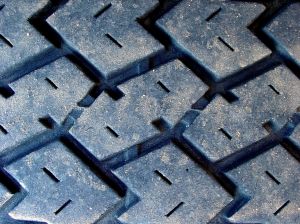While we might expect to see gators sunning themselves at roadside on some long strip of highway in the Florida Everglades, such scenes would be highly unexpected here in Massachusetts. 
We do, however, have an abundance of “road gators,” as they are often called. Although not a massive reptilian, they bear a striking resemblance to such – and can be far more dangerous. “Road gators” are shreds of debris, usually steel-reinforced truck tires that can stretch anywhere from 8 to 10 feet long and weigh 70 pounds or more. This debris is often found on the highway shoulder, but sometimes found lying squarely in the middle of the road – and can cause a serious accident, particularly when on interstates with speed limits of 70 miles-per-hour.
It’s a particular problem in summer, according to the National Highway Transportation Safety Administration. Hot pavement contributes to tire wear and tear, and these problems stretch well into September. Often, people swerve to avoid debris, but the chain reaction ends up being worse than if they had actually struck it. The NHTSA reports swerving to avoid roadway debris causes some 25,0009 crashes each year.
Our car accident lawyers in Massachusetts know liability in these cases can be tricky. Unless it occurs directly in front of the injured party or witnesses, it may be next to impossible to identify the truck from which the debris originated.
In some instances, it may be an option to seek government accountability. In order to pursue such a claim, it would need to be proven the entity responsible for roadway maintenance knew or should have known there was a hazard and failed to act in a timely manner.
However, plaintiffs first must overcome the hurdle of sovereign immunity, under which government entities are often protected. And even if successful, it’s likely damages would be capped. In addition to showing the government’s duty of care and breach of that duty, the injured party would have to show it was the debris – and not some other factor – that was the substantial catalyst for the crash.
Because liability in these cases is so challenging, we encourage a focus on prevention of these crashes. You may not always know when you’ll encounter a “road gator,” but remaining alert, attentive and sober for the drive will help improve the odds you will act appropriately.
The NHTSA recommends those who encounter debris dramatically reduce speed before attempting an evasive maneuver. A slower speed allows the driver to maintain a greater degree of control of the vehicle, thereby reducing the crash risk.
Drivers should also look far ahead when traveling on the highway to make sure if there is debris in the road, they can bolster their reaction time.
Finally, drivers should avoid traveling for long distances next to or behind large trucks. This is especially true if you start to hear something like a howl or continuous “whapping” indicative of a tire soon to shed its tread.
No matter the circumstances of your crash, contact an experienced attorney who can help you consider all your options.
If you are injured in an accident in Massachusetts, call Jeffrey Glassman Injury Lawyers for a free and confidential appointment — (617) 777-7777.
Additional Resources:
Don’t Let Road Gators Bite, June 19, 2014, By Marc Demere, Allstate Blog
More Blog Entries:
Stotler v. Dep’t of Transp.: Sovereign Immunity in Negligence Actions, Aug. 20, 2014, Boston Car Accident Lawyer Blog
 Boston Car Accident Lawyer Blog
Boston Car Accident Lawyer Blog

